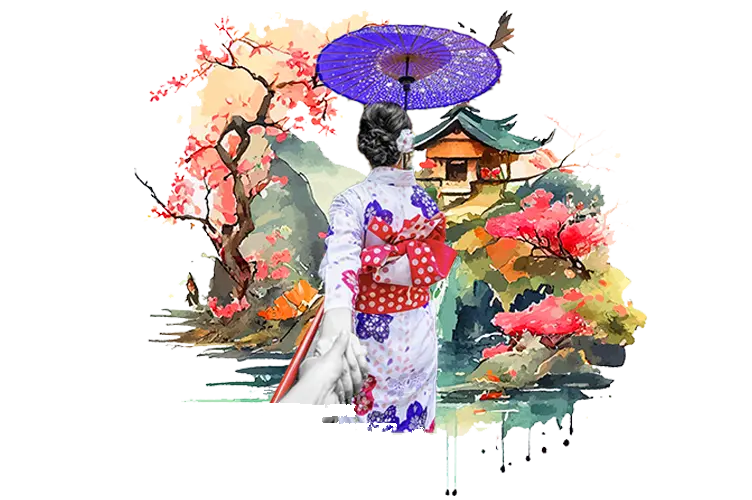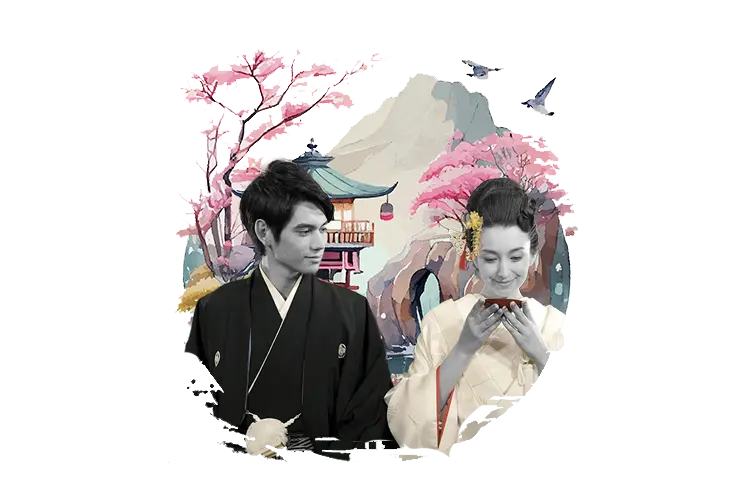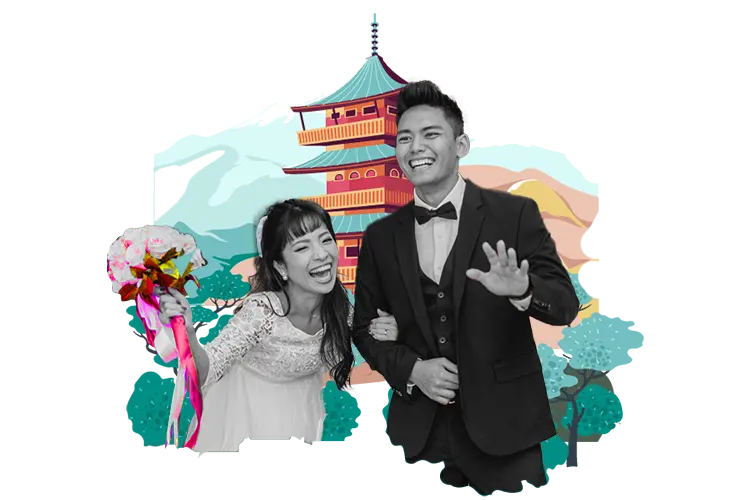
Although Japan has a reputation as an ancient culture steeped in history, the country’s wedding traditions are relatively modern, with many stemming from Western traditions.
Sure, there are Shinto ceremonies and sake-sharing rituals, but Nippon nuptials tend to have more in common with American weddings than you might think. (Nearly two-thirds of Japanese weddings are based on Christian ceremonies, even though less than 2% of the population identifies as Christian.)
Curious? Learn more about the ins and outs of Japanese wedding traditions and keep reading to find out…

Japanese weddings are a mix of modern practices and ancient rituals. Some traditions, like the choosing of the wedding date, happen long before the ceremony. Most, though, are associated with the wedding itself.
Understanding more about these traditions is interesting in and of itself, especially for Japanophiles. For those with Japanese heritage, though, learning about these traditions can help them incorporate them into their special days. Additionally, if you don’t know much about Japanese culture and are invited to a Japanese wedding one day, you’ll want to know a little more.
Whatever camp you find yourself in, this article will tell you everything you need to know about what to expect at a traditional Japanese wedding.
One of the first Japanese wedding traditions takes place long before the ceremony. Yuinou, the Japanese betrothal ceremony, is an opportunity for the bride and groom’s parents to meet. During this occasion, the two families exchange gifts and money to symbolize their new bond.
Choosing a date for the wedding ceremony is another essential part of the early wedding preparations. Although many Western couples choose a date based on special days, weather, and vendor availability, Japanese couples often look at the lunisolar calendar (rokuyo), to choose their wedding date. Taian is the luckiest and most popular day, while Butsumet is the least auspicious day.

Although less than 2% of Japan’s population identifies as Christian, Christian-style weddings are the most popular wedding service, making up approximately 64% of all Nippon weddings. In most cases, Christian weddings take place at a hotel or other wedding venue that looks like a Christian church. Often, the officiant wears priest or minister-associated apparel, even if they have no religious affiliation.
Shinto wedding ceremonies, modeled after Japan’s native religion, are another popular option. These weddings occur within a Shinto shrine and a Shinto priest presides over the event. The ceremony is called “shinzen shiki,” which translates to “marriage before the gods.” Shinzen shiki includes the recitation of wedding vows, exchange of rings, and sacred sharing of sake between the bride and groom.
Whether a couple chooses a Christian or Shinto ceremony, they limit wedding guests to close friends and family. A formal wedding reception, usually in a banquet hall, follows the religious service and includes a sit-down meal and several toasts. Japanese wedding ceremonies don’t typically incorporate a wedding party.
After the formal reception, many couples host an informal after-party called a nijikai, at a neighborhood bar or restaurant. This event welcomes friends and younger family members. The nijikai incorporates the dancing, drinking, and debauchery one might expect at a Western wedding.

What a couple wears on their wedding day depends mainly on the type of wedding they choose. For example, couples who have a Christian, Western-style wedding, tend to wear the type of clothing popular at American weddings — a white wedding gown and/or a tuxedo.
Couples who choose a more traditional Japanese wedding ceremony often wear kimonos. The bride wears a white silk kimono called a shiromuku and a big white hat called a wataboshi or tsunokakushi. Similar to a veil, a bride can wear this large head covering in various styles. Alternatively, a bride may wear an iro-uchikake, a primarily red robe with silver and gold embroidery. The groom’s kimono consists of five layers, with white inner layers and a black outer robe emblazoned with his family’s crest.
Many Japanese brides and grooms change their outfits at least once during the wedding day. Usually, the bride wears a white wedding dress for the religious part of the ceremony, then changes into a more colorful outfit for the formal banquet. Similarly, Japanese men might start the day in a black kimono, then change into a tuxedo or suit later.
If you attend a traditional Shinto wedding, wear socks or stockings, as wearing your shoes or going barefoot in the venue is frowned upon. Women should wear a one-piece dress or kimono. Tradition also requires guests to avoid leather, fur, swinging earrings, and sleeveless garments. Avoid wearing white or black. For more details and specifics for the wedding, always talk to the inviting couple.

Modern Japanese wedding traditions dictate that guests should give the newlywed couple money. This ceremonial gift should be presented in a decorative envelope called a shugi-bukuro.
The amount of money given varies depending on the giver’s relationship with the couple, but the number of banknotes should be odd-numbered to symbolize the couple’s indivisibility. On top of this, the cash should always be given in crisp new bills, symbolizing the couple’s new beginning.
Here’s how much guests are expected to give, based on the current exchange rate:
The couple also gives guests gifts to show their hospitality and gratitude. Smaller wedding favors, called hikigashi, consist of candies, candles, and small pastries, while larger gifts, referred to as hikidemono, can include things like ceramics or toiletries.
Some couples allow guests to choose their own gifts from a catalog. These items might include anything from small kitchen appliances to experience-based gifts like a spa day.
It’s also customary for brides and grooms to give gifts to their parents on the wedding day. A large floral bouquet, called a hanataba, is expected, as is a letter from the bride to her parents. The couple may also give their parents additional gifts like household items or travel vouchers.
Japan doesn’t have strict rules about who pays for the wedding. Sometimes one side of the family pays, sometimes the other, or sometimes the costs are shared. Other times, couples fund their nuptials with help from guests’ monetary gifts.
Some Japanese couples wear wedding rings. However, it’s much more common for Japanese women to wear wedding rings than Japanese men. Both wear their rings on the left hand.
Many brides opt to wear Japanese wedding kimonos called shiromukus. Shiromukus are white and paired with a white hat called a wataboshi or tsunokakushi. Other brides choose to wear a red robe called an iro-uchikake.
Japanese weddings often start in the morning and last all day. First is the traditional ceremony for close family and friends, then a formal reception in a banquet hall, followed by a casual after-party (nijikai) for friends at a restaurant or bar.
Whether you’ve been invited to a Japanese wedding or were just curious about the country’s marriage traditions, we hope this guide has helped you better understand the traditions, ceremonies, and expectations.
Do you want more wedding tradition info? We’ve compiled some great cultural wedding traditions from German to Korean to Irish and more! For more need-to-know wedding info, check out all of The Groom Club’s handy resources.